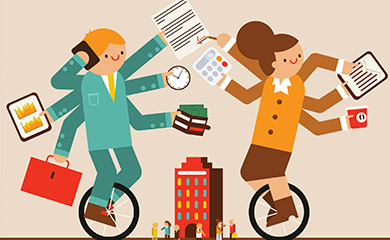
There are a number of strategies I recommend to help people improve efficiency and time management–a hot topic on the minds of many leaders.
But I also recommend that executives remember that no matter how efficient they become, they are not machines. People who manage their time well know that life happens and plans change. It’s good to be efficient, but also self-compassionate.
Here are a few tips for being more efficient, but also for being kind to yourself as you navigate the challenges of real-life.
Effectively manage your email and other communications
If you get a lot of email, be efficient in how you manage it:
- Check your email in blocks of time. While some jobs require being on email constantly, many of us have more flexibility. Think about whether you can check email just three times a day, in “chunks”.
- Touch emails only once. Many people check their email periodically during the day to stay abreast of it and then go back again later and check it again. This means reading the same emails repeatedly before responding. The greater the number of times you read an email, the less efficient. Also, limit using your phone for email.
- Have just three folders for sorting email. One for critical action items/emails that you cannot ignore, another for action items that are less crucial, and a third folder for an archive. With three folders, you can sort email quickly.
- When you’re focused on email, if there’s anything that you can address in less than three minutes, do it immediately. Action item folders should only be used for emails that require more time. Everything else, after you’ve looked at it, should either be saved or deleted. This makes it easier to keep an empty inbox.
If your company uses instant messaging or other more “real-time” communication tools as a major communication strategy, you have to make a judgement call about whether you can turn those off for blocks of time. This is a company culture issue. But research supports the idea that people are less productive when they multitask, so it’s worth trying. It can take a long time to gain focus after even a single interruption from important work.
Implement a “Two Birds with One Stone” approach
When things get very busy, it’s helpful if you can accomplish two goals at the same time.
Here, I’m not talking about multitasking in the sense of flitting back and forth between activities. I literally mean accomplishing two goals simultaneously. For example, walking or riding your bike to work, or having “walking meetings”. In these examples, you are getting exercise while accomplishing something else that you’d be doing anyway.
Secretary of State Colin Powell used to spend 45 minutes on an exercise bike every day. That was also his time to read the daily news. Look for ways to double up like that.
Exercise self-compassion
I find that I’ve repeatedly had this conversation with professionals who have so much going on in their lives. They’re raising children. They have a partner. They have a commute, and they have a demanding job with many responsibilities. The truth is, this is a lot, and even if you practice every efficiency tip imaginable, it still is going to be tough.
There seems to be a mindset, maybe driven by the management and self-help literature, that if we just had all the right techniques and did everything the right way, that we should, in fact, be able to do everything with excellence and be happy all the time. But for people who have very extensive responsibilities in their personal and work lives, that’s probably not a healthy expectation. Certainly, regardless of what kind of expectation you want to keep for yourself, it’s critical to have a healthy dose of self-compassion.
Don’t beat yourself up or feel that you have failed if you’re unable to optimize on everything and find a place of perfect balance. Most of us are a work in process. Kids get sick, employees quit, new products get released. When these things happen and suddenly your exercise routine stops, don’t say you have failed.
The key to getting better at efficient time management is, when you fall off the horse, be kind to yourself about it, and just get back on as soon as you can. You’re not going to get it perfect. Things are going to ebb and flow.
If you’re starting a new set of habits, a new exercise program, or healthier diet, or a new time management regimen, cut yourself some slack. Any progress is good progress. If you do half of what you intend, that’s a big accomplishment. Just don’t quit.
Over time, I do think major responsibilities and full schedules can be navigated successfully, even joyfully. I recommend that you not be too hard on yourself for the inevitable bumps of a normal life.
Interested in learning more strategies? Read Help Others Help You, and Take Time to Save Time.
For even more on the topic of time management and productivity, my favorite resource is a collection of Harvard Business Review Articles.